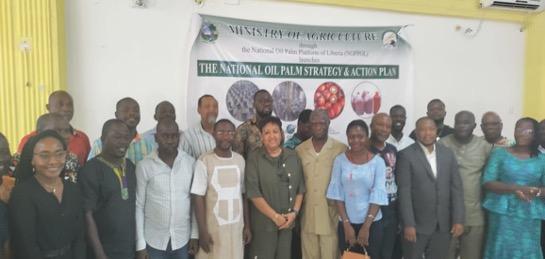MOA Launches National Oil Palm Strategy And Action Plan

Madam Cooper encouraged partners in the oil palm sector to use the Action Plan to develop the sector and boost Liberia's oil palm industry.
Through the National Oil Palm Platform of Liberia, the Ministry of Agriculture has launched a National Oil Palm Strategy and Action Plan (NOPSAP) to guide sustainable oil palm development for the next five years 2021-2026.
The NOPSAP was developed through a multi-stakeholders participatory process with support from UNDP and Proforest. Other development partners, including Good Growth Partnership Project (GGP), Proforest, through the African Palm Oil Conservation International, Solidaridad, Flora, and Fauna International, STAR-P/World Bank, IDH-Sustainable Trade Initiative, provided technical and financial support for the development of the NOPSAP.
“Oil palm is an important tree crop in Liberia that covers more than one million hectares. About 21.1% of the farming household produce palm oil, and more than 220,000 people are employed in the palm sector. But worldwide, oil palm production is given little value, and Liberia needs more effort for the sector’s integrity, maintenance and amelioration,” said Jeanine M. Cooper, Minister of Agriculture.
Launching the document, Minister Cooper said oil Palm production is widely viewed negatively around the world. “That is why the five-year strategy is important because we live in a global community. We need collective effort that will move the entity forward and transform its employees’ lives.”
She called for the establishment of the oil palm development fund that will help communities benefit from their forest.
Madam Cooper encouraged partners in the oil palm sector to use the Action Plan to develop the sector and boost Liberia's oil palm industry.
“This strategy will go a long way in developing our palm oil sector and providing unity amongst affected communities,” the Minister added.
According to her, the strategy will help in the commercialization of palm oil in large quantities.
Galah Toto, Lead Coordinator of the National Oil Palm Strategy, said the plan is intended to access finance for sustainable palm oil development in the country, among others.
“This plan seeks to place the oil palm sector for strategic development,” Mr. Toto explained.
Jenkins Flahwor, who proxied for the Swedish ambassador, promised the Embassy's commitment to work with the MOA in areas that are of priority to the country.
He indicated that the Embassy has a 5-year strategic plan covering biodiversity, climate change, amongst others, and as such, there would be areas in the National Oil Palm Strategy that could be supported by the Government of Sweden.
The launch of the National Oil Palm Strategy and Action Plan highlights the genesis of palm oil production in Liberia.
According to the strategy document, prior to the civil war, the government here solely owned oil palm plantations. Plantations were also owned communally with aid from the government and managed by cooperatives or held under trusteeship by managing communities.
But the situation has now changed, and production of oil palm is being done by medium and smallholders as well as concessionaires. Oil palm is the most widely grown tree crop in Liberia by about 21% of households, which accounts for approximately one-tenth of employment in the agricultural sector.
The NOPSAP aims to guide public and private institutions, small to large-scale producers, technical and civil society organizations participating in the sector to achieve common objectives. The overall goal of the NOPSAP 2021-2026 is to place the oil palm sector as a strategic engine for national and inclusive rural economic growth.
Moses Hassah, Energy and Environment Specialist, UNDP, said the launch is very important because it will benefit communities. He said affected communities must set up a committee that will be responsible to manage the national oil palm development fund.
“There is a lot of money sitting in the oil palm development fund, all because we do not have a committee set up to manage these funds. It is important — the communities will benefit, but the community has to be set up to manage these funds. Let’s get to our communities. How long will it take to just select a representative to represent a fund that will benefit the community?”
